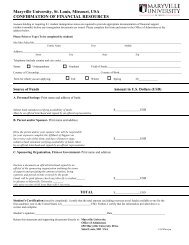EDUC 371 Elementary/EC Junior Practicum - Maryville University
EDUC 371 Elementary/EC Junior Practicum - Maryville University
EDUC 371 Elementary/EC Junior Practicum - Maryville University
You also want an ePaper? Increase the reach of your titles
YUMPU automatically turns print PDFs into web optimized ePapers that Google loves.
2006 EDU <strong>371</strong><br />
Fall <strong>Junior</strong> <strong>Practicum</strong><br />
Overview of the junior practicum year<br />
The junior year is an intense one for <strong>Maryville</strong> <strong>University</strong> teacher candidates in the<br />
elementary education and early childhood programs. Candidates begin the year with a<br />
solid foundation in the moral principles of education in a democracy and most have a<br />
beginning familiarity with lesson design and instruction.<br />
Candidates begin their junior year with a minimum of understanding of how to “see”<br />
children learning, how to run a classroom, or how to negotiate the complex demands of<br />
teaching. By the end of the junior year they should be able to enter a classroom and<br />
have an immediate sense of what needs doing and some idea of how to do it<br />
collaboratively with students and teachers.<br />
By May junior practicum candidates should be able to:<br />
• Plan engaging and substantive short-term lessons around a concept or<br />
classroom need (e.g. start-ups)<br />
• Negotiate large and small transitions in instruction<br />
• Demonstrate beginning abilities in differentiation that adapts instruction for<br />
individual needs within a class<br />
• Present an effective school and classroom presence that helps them get and<br />
keep student attention and ensures their acceptance within the professional<br />
community<br />
• Develop initial plans for meaningful long-term sequences of lessons in light of<br />
student learning<br />
• Share a beginning understanding of how to organize for classroom life, record<br />
keeping, and time management in and out of the classroom.<br />
Cooperating Teacher Role:<br />
Being a cooperating teacher is complex and demanding. We understand that your<br />
ultimate responsibility is to your students and at no time should the presence of<br />
our candidates in your classroom compromise that goal. We also bring our own<br />
concern that our candidates become the best teachers possible. We expect <strong>Maryville</strong><br />
candidates to become immediately active in classroom life, to accept constructive<br />
criticism and grow quickly in response to your and our suggestions. Like all of us, they<br />
need specific and copious feedback on what they are doing well. Please keep the<br />
supervisor informed of ANY area of concern you may have. Also, please share all<br />
areas of growth you believe would benefit the candidate so that we can work on them<br />
together. We rely on your open and honest communication about the candidate’s<br />
progress. Please remember, this is not “getting the candidate in trouble,” but<br />
helps all of us ensure s/he becomes the best teacher possible.<br />
Early in the year candidates often need help learning to take initiative in the classroom<br />
and for planning. They should be increasingly resourceful and initiate ideas; they<br />
should work with students without prompting, and they should increasingly offer to take<br />
responsibility for activities, students, etc. At the beginning, you may need to suggest (or<br />
even assign) tasks, but by November the candidate should be suggesting things on<br />
her/his own.<br />
Page 4 of 5

















